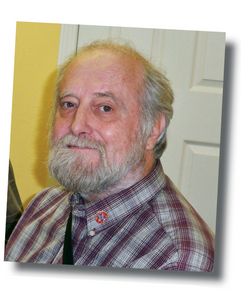

James Turner will discuss his paranoid schizophrenia as part of "In Our Own Voice" during The Big Read in Abingdon.
In conjunction with The Big Read, A! Magazine decided to explore the theme of Creativity and Mental Illness by interviewing an artist who is trained in the program "In Our Own Voice" that will be presented during The Big Read.
James Turner, a Peer Support Specialist at Highlands Community Services, is very candid about his experiences.
"I have been a patient and a staff member here for nearly five years," Turner says. Originally from Georgia, he came to Southwest Virginia because "I heard about the mental health program in this area and was told I could get the help I needed."
Turner mentors individuals four days a week as part of a wellness recovery action program, teaching them how to cope with their illnesses. On Fridays he visits patients at the state hospital in Marion, Va., giving them hope and understanding.
He says, "I demonstrate to them that they can be involved in their own recovery process, and I tell them it's possible they can get out and have a life, too. I share my experiences: what it's like being ill and what I do to cope, my goals and my plans for the future."
Turner has been diagnosed as a paranoid schizophrenic. He says, "In the media, that diagnosis has been portrayed as a very violent, disturbed person, but I'm not either of those. I've never hurt anyone, except maybe their feelings."
He recalls, "When I was about 12 or 13, I told my mother I had a radio in my head 'cause I could hear voices and music. She asked me if it bothered me. When I said no, she told me not to worry about it and she wouldn't, either. Even when I had my first psychotic episode and got in trouble with the police, she didn't make an issue of it. I was caught up in delusions about what was going on around me, so they put me in a hospital, and they gave me strong tranquilizers to calm me down. That was almost 50 years ago, so there wasn't much they could do for me at that time. That was just past the time when all they did was lock people up."
Now age 64, Turner says he finally got the right diagnosis and treatment about 15 years ago. "They didn't have the medicine available until then to treat me appropriately," he explains. "Over the years, every time I changed doctors, the diagnosis changed. And then you have to find the right medication through trial and error, a cocktail of medicines tailored to each person's illness. It's not so much the diagnosis as getting the right mixture of medications. And I'm very aware of the necessity of taking medications that are right for me. That makes all the difference in the world."
In the process of finding the right medication, Turner was involved in a number of different drug trials. He says, "Every medication over the years helped me some, but the medications in the last 15 years have reduced my symptoms to the point that I'm not caught up in them."
As part of "In Our Own Voice" during The Big Read in Abingdon, Turner and his associates will encourage questions from the audience "in order to bust stigmas, so they don't have preconceived notions that mentally ill people are different. Just like people who have diabetes or heart disease, we're regular people who have illnesses. We have the same hopes and aspirations. We want to be able to have a life with friends, relationships and meaningful activities to fill our days. In my case, I have a regular job and that means a lot to me."
THERE'S MORE:
>> What Others Are Saying